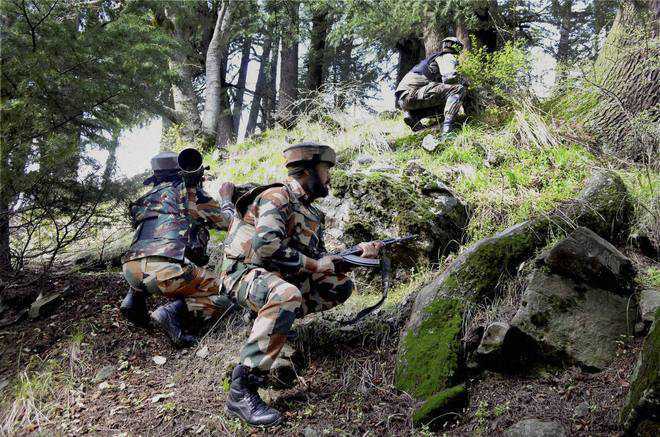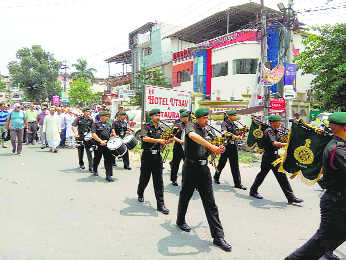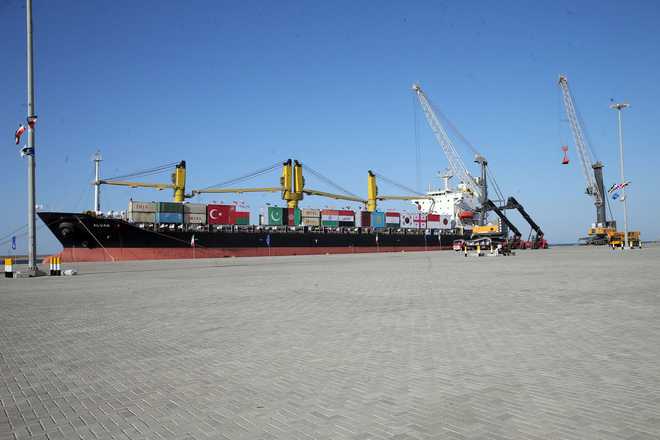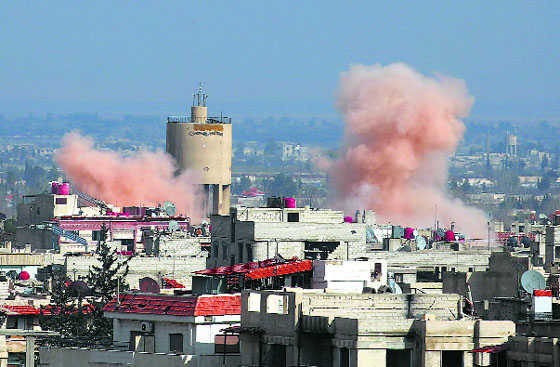The political class has come to be identified with everything immoral and decadent. Some suggestions on how it can begin to redeem itself.
It is commonly said that cinema is a true reflection of popular thinking of society at large and villains have been an integral part of the Indian cinema since the beginning, However, their characterisation has been undergoing changes to conform to changing public perception. The iconic K N Singh lent a certain degree of sophistication to villainy, Ajit added wry humour and Amrish Puri some distinct mannerisms. But today, villainy seems to have become the exclusive domain of political leaders.
Nowadays, the moment a character in khadi and white cap appears on the screen, the audience recognises him as the chief villain. Worse, he is often shown occupying the coveted chair of home minister. He patronises criminal gangs, has corrupt police officers in tow and has no inhibitions in selling the country for money. He supports widows’ homes overtly but demands women covertly. He divides people by instigating religious riots. In short, he is depicted as the most unscrupulous and devious specimen of humanity. Interestingly, no political leader has ever contested such a projection.
One is reminded of two cartoons that appeared in the press in the wake of the terrorist attack on Parliament in 2001. One showed a terrorist dissuading another one from entering the main hall of Parliament to lob grenades, saying, “No, no, don’t kill Indian politicians. That will be a pro-India act.” Another cartoon showed Indian citizens rueing that the Pakistani terrorists had let India down, “They would have earned our gratitude by ridding us of a few politicians.”
In India, politics has come to be identified with everything immoral and decadent. It is often said that people get the leadership they deserve. But do Indians have a choice? When they go out to vote, the whole exercise gets reduced very often to voting for the lesser devil.
The Rot Starts at the Bottom
A municipal corporator is the fountainhead of corruption and catalyst of every single ill that afflicts India. His sole aim is to amass as much wealth in as short a period as possible. Even one tenure as corporator is good enough to cater for the next three generations.
A corporator encourages encroachment on government land to create vote banks. Proliferation of slums in all cities can be attributed to his political facilitation and protection. He takes money from illegal shops and vendors to save them from eviction. In some cities, corporators do not let the municipality supply piped water to certain areas so that water tankers owned by them remain gainfully employed. No development work can be carried out in a ward unless the contractor obliges the corporator.
As corporators control local vote banks, they are wooed by all political parties, both at the state and the central levels. An unholy quid pro quo nexus thus develops — the political party provides protection to the corporator for his illegal activities and, in return, the corporator delivers vital votes to the party.
Disregard for National Interest
Facilitation of illegal immigrants from Bangladesh has been the gravest anti-national mischief in independent India. As a result, immense damage has been done to the demography of Assam, with 30 Islamist groups thriving in the area. Worse, some political leaders assail those who demand a check on the ongoing influx.
To Indian politicians, vote bank politics preclude letting countrymen stay united. They generate innovative issues to divide the people to keep them embroiled in petty discords and internal dissensions. During the last elections in Gujarat, the poison of divisive politics was perfidiously injected into the social fabric. With consummate skill, parochial leadership was nurtured to generate dissensions amongst Patidars, scheduled castes and tribes and other backward classes, thereby dividing society for electoral gains.
Recently, a renowned advocate and a former law minister told a TV channel that shouting slogans for the destruction of the country is not debarred in the Constitution. Some political leaders extended their support to a delinquent student leader who seeks destruction of India. Comparing him with Bhagat Singh was by far the most perfidious act. Perhaps India is the only country that has the ignominious track record of producing home ministers who revelled in presenting Pakistan with anti-India ammunition. Similarly, alleging that the Batla House encounter in 2008 edia ecstatic. It keeps mocking India to date.
Some of our leaders display compassion for the stone-pelters of Kashmir who abet terrorism but never shed a tear for the hapless soldiers and policemen braving them. There seems to be no level too low for India’s politicians to stoop to.
Disdain for legislative bodies
India spends hundreds of crores of rupees annually to sustain central and state legislative bodies, the so-called “temples of democracy”. All political parties are guilty of lowering the image of these institutions. It is disgusting to see members storming the well of the house, displaying placards, shouting slogans and howling to prevent the house from transacting any business. And they have the brazenness to call such behaviour as their democratic right to oppose the government.
We elect leaders and give them tenure to fulfil the promises made to us and not to waste money from the national exchequer. But it is rare today to hear a member deliver a well-researched and articulated speech. Most of the time, the houses witness shouting and slanging bouts.
Attendance is woefully low. Most members spend time in the canteens rather than attend the sessions. Many members utilise the comfort of the house to get their forty winks as the droning and monotonous proceedings put them to sleep. It is revolting to watch leaders chewing tobacco in the house and even speaking with their mouths full with zarda. A vociferous opposition leader can hardly be understood with his mouth painted red with betel-nut. This is the example they are setting for younger generations.
Penchant for Unbecoming Behaviour
When Congress Member of Parliament Shashi Tharoor declares, “it’s safer to be a cow than a Muslim in India today,” he puts the whole country to shame. The world media flashes such headlines with sinister pleasure. India’s image takes a terrible beating. Hamid Ansari’s last interview as the vice-president was certainly malicious. After having enjoyed all the perks and privileges of office for 10 years (three years under the present government), his conscience troubled him only on the last day in office. His assertion that India’s Muslims are living with a “feeling of unease” and “a sense of insecurity is creeping in among them” was malevolent in intent and designed to damage India’s secular image.
We have witnessed our legislators misbehaving on aircraft, in trains, at toll barriers and other public places. Their arrogance and demand for special treatment are obnoxious. The images of a legislator sprinkling petrol in a government office and threatening to burn it down shocked the country. Thrashing of a senior bureaucrat for not acceding to the unreasonable demands of ruling legislators shows the depths to which the political narrative has sunk in India.
As politics has acquired the traits of a family business, the conduct of their progeny is equally disgraceful. Uncouth, foul-mouthed and ill-mannered school drop-outs are commanding wealth worth hundreds of crores of rupees through sheer muscle power and political patronage. Does it surprise anyone that not a single progeny of the current crop of political leaders has excelled in any scientific or academic pursuit?
Obsession with Personal Security
Unfortunately, the importance of a leader has come to be judged by the number of security men surrounding him. Hence, there is a competition to obtain the highest category of security. Over 60 per cent of the NSG (National Security Guard) commando strength is deployed on personal security duties. It is a loathsome sight to see goons masquerading as mass leaders surrounded by elite security personnel. In an interesting case, an absconding criminal was made a minister; the police that had been hunting for him earlier was tasked to provide security to him.
In an Indian state, the leader of one political party apprehends a threat from another party and demands government protection, while the leader of the second party seeks similar security fearing attack by the first party. Both leaders are provided state security. Most barefacedly, they join hands for electoral gains. Worse, most escorts are treated as personal attendants and asked to run errands. Threat to personal security is a facade to get a retinue at the state’s cost. There cannot be a bigger misuse of taxpayers’ money.
Similarly, provision of security to retired dignitaries should be purely threat-based and not as a matter of entitlement. Why should every retired president, prime minister, chief minister or other high-ranking appointment be provided elaborate state security as a matter of routine? Who would ever want to harm Manmohan Singh, Pranab Mukherjee and Pratibha Patil?
In any case, leaders who are paranoid about personal safety should avoid public life and shun politics. They should be ready to face threats as the common citizens do. People find it offensive when stopped for long periods by rude policemen to make way for the cavalcade of some egotistical leader. Thank god, an end has been put to the culture of flaunting red lights.
Undue Privileges
Members of the Indian legislatures are perhaps the most pampered lot. Interestingly, they are the only ones who have the powers to grant pay hikes and pensions to themselves. Such an arrangement makes a mockery of the principle of avoiding conflict of interest. All inter-party differences disappear when the issue of protecting their right to decide the entitlement and quantum of pension faces a challenge.
It takes a minimum of 20 years of service for a government employee to earn a pension. Our MPs become eligible for life-long monthly pension of Rs 20,000 even if they serve for just a day. However, those who serve for more than five years are entitled an additional sum of Rs 1,500 for every year in excess of five years. On the demise of an ex-MP, his spouse or dependent receives a family pension for life. State legislatures can never be found lagging behind in such pillage of the public money. Recently, the Tamil Nadu assembly hiked the salary of its members from Rs 55,000 to Rs 1.05 lakh per month and pension from Rs 12,000 to Rs 20,000.
One has heard of food subsidy for the deprived and the underprivileged sections of society. To subsidise food for the richest and the most privileged elite is an affront to basic human values. Under considerable public criticism, the Parliament House canteen recently hiked the rates of the dishes. Even after the price increase, a plate of dal costs Rs 5, roti Rs 2 and tea Rs 3.
Many unscrupulous characters rent out their allotted government houses to make a quick buck. Many leaders decline to vacate their accommodation after their entitlement gets over and have to be forcibly evicted. Another common stratagem is to hold on to the accommodation in the guise of a memorial for the departed leader. One odd room is used to house the household memorabilia of the deceased leader while the rest of the bungalow is merrily used by the extended family.
Way to Redemption
Understandably, no one joins politics for public service. It has become the most lucrative profession. In no other profession can so much be amassed in so short a time. Hence, all sensible and far-sighted parents want their children (especially if they are good for nothing else) to join politics. Parties are functioning as family fiefdoms to further the prospects of the progeny.
Political leaders believe in the ends and not the means. Only power matters. They bank on short public memory to remain in business. However, many optimists feel that all is not lost. They want to build strong public and media pressure, hoping that some sensitive leaders may get persuaded to introspect.
To start with, a moral code of conduct for politicians should be evolved jointly by all political parties. Leaders must be asked to behave in public in a befitting manner. They should demand no immunity for their unbecoming conduct. They must stop demanding special privileges and identify themselves with the common man. Any political leader who does not vacate the allotted government accommodation or misuses it should be publically named and shamed. Provision of security should be purely threat-based and not as a matter of perk/entitlement. It is for leaders of stature to set an example by voluntarily renouncing excessive security.
To ensure orderly functioning of the legislative bodies, it is essential that the unruly elements be prevented from entering the well of the house to disrupt proceedings. For that, why not erect a five-feet-high glass barricade around the well? It will segregate the chair and the secretariat from the rest of the house. There should also be a facility to switch off the microphones of the rowdy members. They can cry themselves hoarse while the house can transact its business. Many will consider the above suggestions to be too drastic; but then, extraordinary problems need radical solutions.
Most of us are sceptical about the likelihood of a change of heart amongst the political leaders; their track record hardly inspires confidence. However, one is hopeful that some elements of our political elite would certainly be feeling uncomfortable with the current standing of the political class. They must be yearning to redeem their credibility. Howsoever small their number may be, they can certainly initiate a movement to cleanse the system.
To end on an optimistic note, let us look at two encouraging developments. They provide a ray of hope. One, MP Varun Gandhi questioned the parliamentarians’ powers to increase their own salaries and recommended that economically advantaged MPs should forego their remuneration for the remainder of the current Lok Sabha. Two, MP Manoj Tiwari proposed deducting the salaries of MPs for their failure to engage in any constructive work and wanted the fair practice of no-work-no-pay to be followed. Even if a small segment gets spurred to introspect, the country may witness a change for the better.*****






















































































































